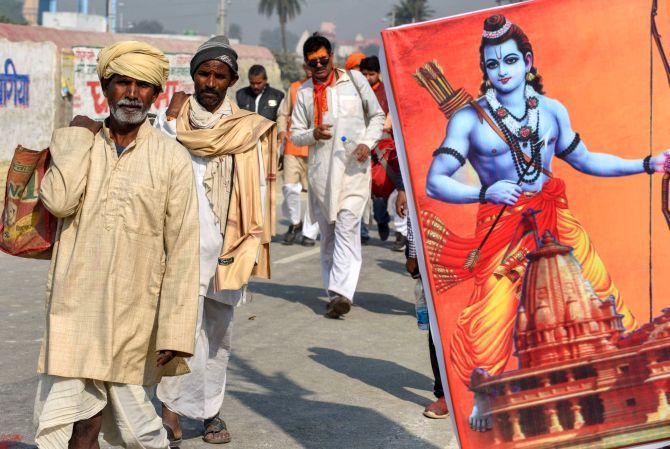The Supreme Court Wednesday said it will pass orders on whether to refer the Ram Janmabhoomi-Babri Masjid land dispute case for mediation, underlining that it has no control over what Mughal ruler Babar did and is only concerned with resolving the present situation.

The top court said it thinks that primarily the issue is not about 1,500 square feet land, but about religious sentiments.
A five-Judge Constitution Bench headed by Chief Justice Ranjan Gogoi, which reserved verdict on referring the matter for mediation, said that it is conscious of the impact of the issue on 'public sentiment' and on 'body politic'.
"Arguments on the issue of reference to mediation are closed. Arguments concluded. Orders reserved," said the bench, also comprising Justices S A Bobde, D Y Chandrachud, Ashok Bhushan and S Abdul Nazeer.
Hindu bodies like Nirmohi Akhara suggested names of Justices (retd) Kurian Joseph, AK Patnaik and GS Singhvi as mediators, while the Hindu Mahasabha faction of Swami Chakrapani proposed the names of former CJIs Justices J S Khehar and Dipak Misra and Justice (retd) A K Patnaik to the bench.
While reserving the order, the court had said that the parties involved in the case may suggest names of mediators for consideration if it orders mediation on the dispute.
During the hearing, Hindu bodies except Nirmohi Akhara opposed the suggestion of the court to refer the issue for mediation, while Muslim bodies supported it.
At the outset, when a counsel appearing for a Hindu body said that the issue should not be referred for mediation as it would fail and public would not agree, the bench said that it is not appropriate to pre-judge.
It said that when the court orders mediation, outcome is not the consideration and it is not assuming that someone will give up its claim.
"You are saying it will be a failure. We are not assuming that somebody will give it up. Primarily, we think this issue is not a property dispute. It is not about the 1500 sq ft but it is about the religious sentiments and faith.
"We are conscious about the gravity of the issue and we are also conscious about its impact on body politic of the country. We understand how it goes and are looking at minds, hearts and healing if possible," the bench said.
When a lawyer contended about the injustices meted out to the Hindus by invaders in the past, the bench said, "We are not concerned what has happened in the past.
"Don't you think we have read the history. We are not concerned what Babar did in the past or who was the king and who invaded. We cannot undo what has happened but we can go into what exists in the present moment".
Senior advocate Rajeev Dhavan, appearing for the legal heirs of original litigant M Siddiq, said that outlining of the dispute is not necessary and court can order mediation by an mediator, when parties are unable to settle it.
To this, the bench said that there may not be one mediator but a panel of mediators to deal with the issue.
Dhavan said that mediation in the peculiar facts of the case can be ordered in-camera and no parties should be allowed to disclose the proceedings till the final report is filed.
The bench agreed with the contention of Dhavan that confidentiality of proceedings should be maintained and said it thinks there has to be complete ban on media reporting on the developments of mediation process.
"It is not something like gag order but there should be no reporting. It is easy to attribute something to somebody when the mediation process is on," the bench said.
During the hearing, Justice Chandrachud said that considering it is not just a property dispute between the parties but a dispute involving two communities, it would be very difficult to bind millions of people by way of mediation.
"Adjudication of a dispute is legally binding but how can we bind millions of people by way of mediation. It won't be that simple," Justice Chandrachud said, adding, it is desirable that dispute is resolved through peaceful talks.
Two faction of Hindu Mahasabha took opposite stand on the issue of mediation with one body supporting it, the other opposing it.
Bharatiya Janata Party leader Subramanian Swamy told the bench that the government has the right to give away land to whosoever it wants after paying compensation to the others.
"P V Narsimha Rao government had in 1994 made commitment to apex court that if ever any evidence was found that there was a temple, land will be given for temple construction," said Swamy.
Senior advocate C S Vaidyanathan, appearing for Hindu deity Ram Lala Virajman said the faith that Lord Rama was born in Ayodhya is not negotiable but the question is of Rama Janamsthan (birth place).
"We are even willing to crowd-fund a mosque somewhere else but no negotiations can take place with respect of Lord Rama's birthplace. Mediation won't serve any purpose," he said.
Solicitor General Tushar Mehta, appearing for the Uttar Pradesh government, said the court should refer the matter for mediation only when there exists an element of settlement.
He said considering the nature of the dispute it will not be prudent and advisable to take this path of mediation.
Fourteen appeals have been filed in the apex court against the 2010 Allahabad High Court judgment, delivered in four civil suits, that the 2.77-acre land in Ayodhya be partitioned equally among the three parties -- the Sunni Waqf Board, the Nirmohi Akhara and Ram Lalla.











 © 2025
© 2025